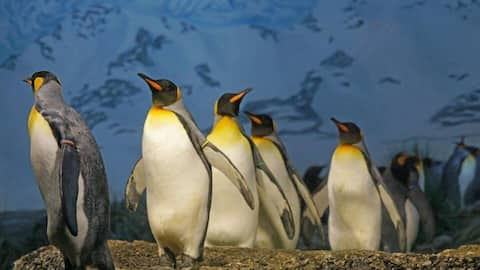Penguin swims 3,500 km from Antarctica to Australia for food
What's the story
An emperor penguin was seen on Ocean Beach in Denmark, Western Australia after an amazing journey of over 3,500 km from Antarctica. The sighting was reported by Australia's Department of Biodiversity, Conservation and Attractions (DBCA) last Friday. The long journey left the penguin malnourished and it is now under the care of a local wildlife carer. A DBCA officer is helping with the rehabilitation process which is expected to take several weeks.
Rare occurrence
First emperor penguin sighting in northern Australia
Belinda Cannell, a research fellow at the University of Western Australia, said this is the first time an emperor penguin has been spotted so far north. She speculated the penguin probably followed ocean currents from Antarctica that may have drifted further north than normal. Cannell also suggested that penguins often navigate these currents in search of diverse food sources. The penguin's unexpected appearance left beachgoers surprised and intrigued, marking a rare occurrence in wildlife sightings in the region.
Unusual sight
Beachgoers stunned by penguin's size and behavior
Local surfer Aaron Fowler described the penguin as "massive" and "bigger than a sea bird." He remembered people asking what the unusual creature was emerging from the water. Fowler also noted the penguin's attempt to slide on its belly in the sand mistaking it for snow. This unusual behavior further highlighted the penguin's displacement from its native Antarctic habitat.
Antarctic natives
Emperor penguins: The giants of the penguin species
Emperor penguins are the tallest and heaviest of all penguin species, standing over a meter tall and weighing up to 40 kg. Native to Antarctica, these penguins depend on sea ice for survival. Rising temperatures and melting sea ice are major threats to their habitat, which could lead to unusual sightings like this one in Australia.
Extinction
Emperor penguins on the brink due to climate change
Emperor penguins, native to Antarctica, are increasingly threatened by climate change. These penguins rely on sea ice for breeding, protection, and food foraging, yet rising global temperatures due to greenhouse gas emissions are causing the ice to melt. A 2023 study revealed that four out of five colonies in the Bellingshausen Sea experienced complete chick loss in 2022, marking the first catastrophic breeding failure and suggesting over 90% of colonies could face extinction by 2100.
